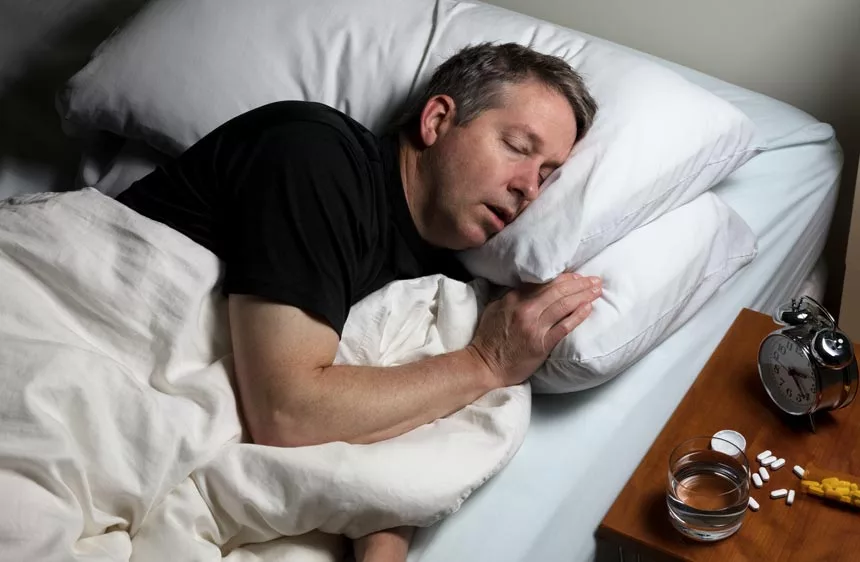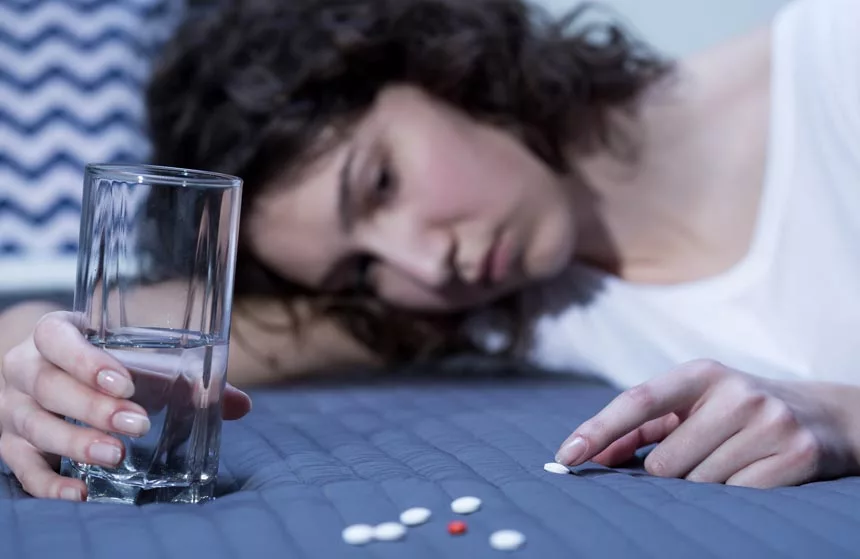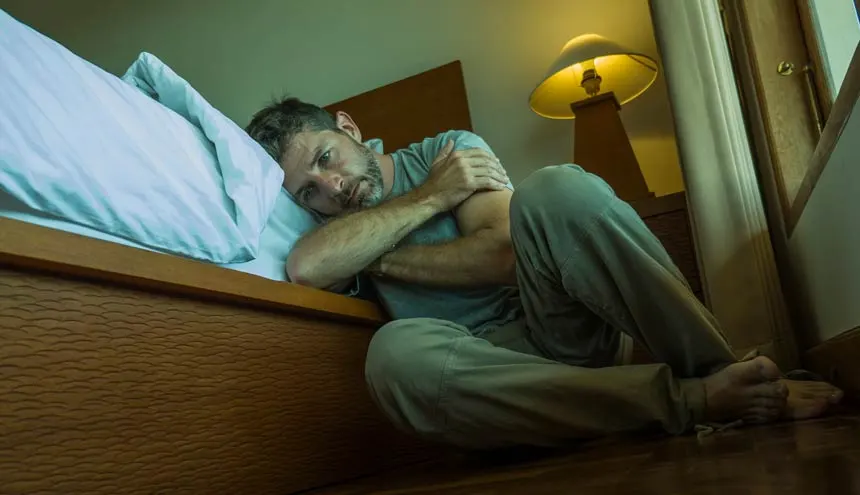The Risks and Rewards of Sleeping Medications
Table of Contents
- The Risks and Rewards of Sleeping Medications
- What Are Sleeping Pills?
- Why Do People Use Sleeping Pills?
- How Do Sleeping Pills Affect Our Body?
- Can You Overdose On Sleeping Pills?
- What Are The Side Effects Of Using Sleeping Pills?
- Are There Withdrawal Symptoms With Sleeping Pills?
- Sleeping Pills Addiction Treatment
- What Does The Addiction Treatment Process Look Like?
- Treatment for Sleeping Pills: Found Here
- Medically Reviewed By
Sleeping pills are a great medication to aid people with troubled sleep. There are many people who struggle with getting the proper sleep they need to function throughout the day. This medication can help someone feel at ease and well-rested following a good night’s sleep.
They can, however, be dangerous if they aren’t taken properly and can lead individuals into unwanted situations and even overdose. Keep reading to find the answers and factors involved in the question, ‘Can you overdose on sleeping pills?’
What Are Sleeping Pills?
Sleeping pills or sleeping medications are a form of medicine to assist individuals with falling and staying asleep. They are also known as sedatives or hypnotics and can be given as an over-the-counter medication or as a prescription medication.
Taking sleeping pills directly affects the central nervous system to support an individual in receiving proper sleep. With the many different factors that can affect sleep, these medications can help maintain the necessary proper sleep an individual may need.
Many prescription sleeping pills can also be called central nervous system depressants which work to slow activity within the brain and body. This allows an individual to feel more relaxed and sleep more easily in this relaxed state.
Over-The-Counter Sleeping Medications
Over-the-counter (OTC) sleeping medications are available for anyone who requires them. This can be very supportive for individuals struggling sparingly with maintaining proper sleep. Considering the availability of OTC sleeping medicines, they are not an addictive form of medication.
They do, however, can cause a tolerance to build within an individual which makes the medicine less effective. As individuals can become more resistant to these medications, it is often best for individuals to use this medication only when they require it.
Prescription Sleep Medication
There are many prescription medications that support individuals with the needs of their conditions or situations. Sleeping medication specifically allows individuals to get the proper sleep they need and maintain proper bodily functions throughout the day.
Some of the most commonly prescribed medications for sleep include:
- Zolpidem (Ambien)
- Zaleplon (Sonata)
- Eszopiclone (Lunesta)
- Ramelteon (Rozerem)
When taking these common sleeping pills, It is important for you to tell your medical provider about any other medications you may be on. Mixing two substances can be dangerous and harmful for your body and cause harmful effects on your body.
Why Do People Use Sleeping Pills?
Individuals struggling with anxiety, sleeping disorders, such as insomnia, or other environmental factors can make it very difficult to maintain proper sleep. These factors can interrupt the body’s natural sleep process and make it difficult for an individual to fall asleep.
There are also many other conditions or situations that can cause issues with sleep such as high levels of stress, substance abuse, and intense pain. These experiences can influence insomnia within individuals.
Insomnia affects 20% of the adult population and can be a short-term or long-term issue. Often in the cases of long-term insomnia, there are more intense factors or a multitude of factors that are disrupting the natural sleeping processes.
This medicine is typically used in short periods of time to assist an individual with maintaining proper sleep; however, the best way to supplement proper sleep is to make changes to habits and daily experiences in an individual’s life. These methods can include but are not limited to:
- Abstaining from caffeine and other stimulants
- Proper daily exercise (20-30 minutes of moderate physical activity)
- Avoiding electronic devices such as a phone or TV near sleeping hours
- Falling asleep and waking up consistently around the same time
When struggling with proper sleep, implementing these behavioral changes while utilizing this medication in short-term use can allow an individual to retain proper sleep without the help of sleeping pills.
These methods can also support individuals struggling with sleeping disorders or other sleeping issues and help them in managing their experience with sleep. It is important to keep in mind that these methods may not work immediately.
It can take around a week before someone begins experiencing the desired effects. This is where using sleeping pills in short-term use can help. Using the pills while maintaining the behavior changes can make the transition away from pills much easier.
Are Sleeping Pills Addictive?
There are many sleeping pills that have addictive qualities. Sleeping pill addiction isn’t inherent in every sleeping pill medication however, it is important to be wary of the effects of the medicine you are taking to best avoid addiction.
Prescription sleeping pills are medications with the potential for addiction. An individual taking in a high dosage over a long period of time is at risk of addiction. This is why an individual should stick to a low dosage over a short period of time.
How Do Sleeping Pills Affect Our Body?
As sleeping pills are sleep aids, they assist an individual to fall asleep. This is done through the effects of increasing a natural chemical in the brain called gamma-aminobutyric acid (GABA).
Most sleeping pills work to support GABA activity in the brain and promote relaxation. This leads to the muscle relaxing, drowsy-inducing, and calming feelings that come with sleeping pills.
Although this may seem very beneficial, these sleeping pills can also come with unwanted side effects. They can also cause other issues for individuals throughout their mornings.
Can You Overdose On Sleeping Pills?
Yes, it is possible to overdose on sleeping pills. A sleeping pill overdose occurs when someone takes too many sleeping pills. Every individual’s body works differently and can respond differently to an excess amount of the substance.
Combining sleeping pills with other substances, which do include other prescription drugs, can add to the risk of overdose. An individual is more likely to face harsh consequences from sleeping pills when taking other drugs alongside them (also known as polysubstance abuse).
What Are The Signs Of A Sleeping Pill Overdose?
It is important to know the signs of a sleeping pill overdose to best support individuals in recovering from an overdose. When an individual is overdosing, they will experience overdose symptoms which include:
- Lowered heart rate
- Respiratory depression
- Loss of consciousness
- Cardiac arrest
- Seizures
If you or a loved one are experiencing these symptoms, call emergency medical services for immediate attention. Unfortunately, these symptoms can result in death. With lowered respiratory functions, an individual is likely to experience hypoxia.
Hypoxia is a harmful condition in which not enough oxygen is reaching the brain. This can have both short and long-term damage to the brain and even lead to serious situations such as coma or death. It is important for an individual to be aware of these symptoms to best avoid a dangerous situation.
What Are The Side Effects Of Using Sleeping Pills?
Each sleeping medication will produce its own side effects and can also vary depending on the person. OTC sleeping pills have minor side effects which include:
- Feeling groggy after waking up
- Memory issues
Prescription sleeping pills are often much stronger than what individuals can get without a doctor’s prescription and so they come with more apparent and prevalent side effects. Some of the side effects of prescription sleeping pills include:
- Feeling drowsy or dizzy in the daytime
- Issues with balance
- Disorientation
- Memory issues
While these side effects can be manageable, there are some more intense side effects to watch out for. These side effects include:
- Feeling extreme joy or euphoria
- Excessive nervousness
- Cognitive dysfunction
- Difficulty concentrating
- Performance issues
- Falling over from a loss of balance
Are There Withdrawal Symptoms With Sleeping Pills?
Although OTC sleeping pills do not usually come with withdrawal symptoms, prescription sleeping pills typically do. It often takes around a week for an individual to adjust to the effects of sleeping pills. They can feel tired throughout the day
- Trouble sleeping
- Restlessness
- Anxiety
- Shivering
- Circulation problems
Withdrawal symptoms are often relapsed provoking and while an individual may want to stop using sleeping pills, their uncomfortable and lowered experience will drive them to use them again to relieve the experience.
Gradually lowering the dosage, also known as tapering, can assist an individual with overcoming sleeping pill dependence. This allows an individual’s body to slowly adjust to having less of the drug being used within the body.
Tapering can avoid many of the uncomfortable and unwanted withdrawal symptoms that come with stopping use.
Sleeping Pills Addiction Treatment
There are many different reasons an individual can become addicted to sleeping pills but it is important for them to receive the treatment they need. The withdrawal symptoms can be very intense and relapse provoking and so tapering is a common method for treating sleeping pill addiction.
This portion of treatment is only the beginning and an individual must undergo the proper addiction treatment to best recover from addiction. It is likely that someone has had difficult experiences along with past trauma or mental health issues, and these factors can lead them to take more drugs and even become addicted.
Proper addiction treatment will address all of an individual’s needs for proper treatment which can include treatment for getting proper sleep. There are many different forms of therapy available, one of which is behavioral therapy.
Behavioral therapy is a form of therapy that supports building healthy behaviors and actions within an individual. This can be seen in cognitive behavioral therapy as well as other forms of behavioral therapy.
Cognitive behavioral therapy is a form of behavioral therapy in which an individual learns and understands the pros and cons of substance abuse as well as how to manage their experience and avoid dangerous situations. With this, they are able to lead healthy and stable lives.
What Does The Addiction Treatment Process Look Like?
The addiction treatment process will begin with a drug detoxification program, such as medical detox, where an individual will cleanse a substance from their body before beginning addiction treatment.
This process can take from 3-5 days to up to 2 weeks in cases of long-term dependence. After undergoing this process, a person will transition into addiction treatment and follow a treatment plan that fits them and their needs.
Proper addiction treatment takes at least 90 days for full treatment however, longer treatment may be recommended if it is beneficial to the individual. Longer treatment often helps to reinforce and maintain recovery that is lasting.
Medical Detox
Medical detox is an inpatient drug detoxification program in which an individual must live on-site to undergo this process. This program works best for someone who is struggling with severe withdrawals and can assist greatly in the detoxification of a drug from their body.
This program also allows individuals to receive 24-hour medical attention and support through their withdrawals and possibly even be provided with medication to manage their experience. These medications will be administered by medical staff to ensure the proper ingestion of these medicines.
Inpatient Treatment
Inpatient treatment is a form of treatment in which an individual is required to live on-site at a treatment facility to receive treatment. This allows an individual to be removed from their current environment, which may be relapse-provoking, and live in a safe and more stable environment.
This style of treatment allows for an individual to receive intensive treatment and work on recovering from the problems with addiction.
Outpatient Treatment
Outpatient treatment is a form of treatment in which an individual can receive treatment during the day and leave after receiving treatment. Outpatient treatment is flexible and allows individuals to receive treatment while maintaining other outside responsibilities such as work or school.
This treatment is also a better financial option for individuals to receive treatment. As it is often less intensive than inpatient treatment, an individual struggling financially is more likely to undergo this form of treatment.
Treatment for Sleeping Pills: Found Here
Sleeping pills can be very helpful for individuals, but can in some cases lead to addiction. Here at Find Addiction Rehabs, we help make finding addiction treatment easy.
Whether finding a treatment center in your location or connecting you with recovery tools and resources, our hotline is available 24/7 to make sure you can get the help you need, anytime you need it.
Sleeping pill addiction can lead to many harmful consequences if allowed to continue. Make a confidential call to Find Addiction Rehabs today and we can help find you the right form of treatment now!
Deborah Tayloe is a freelance writer specializing in health and sciences. Deborah earned a B.S.Ed. in Secondary Education/English, accompanied by a Spanish minor. Her writing expertise allows her to craft engaging, impactful articles to help people be well.
In addition, she holds a fully accredited Certificate of Natural Medicine and is a certified Herbalist. Through her understanding of complementary medicine, Deborah helps medical professionals give people the information they need to embrace natural approaches to wellness.
When she’s not working, Deborah trains for 5K races and advocates for animal rights.






